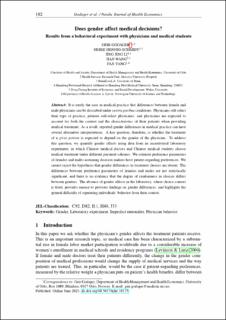| dc.contributor.author | Godager, Geir | |
| dc.contributor.author | Hennig-Schmidt, Heike | |
| dc.contributor.author | Li, Jing Jing | |
| dc.contributor.author | Wang, Jian | |
| dc.contributor.author | Yang, Fan | |
| dc.date.accessioned | 2024-02-05T10:08:42Z | |
| dc.date.available | 2024-02-05T10:08:42Z | |
| dc.date.created | 2023-05-22T17:47:44Z | |
| dc.date.issued | 2023 | |
| dc.identifier.citation | Nordic Journal of Health Economics. 2023, 6 (1), 182-215. | en_US |
| dc.identifier.issn | 1892-9729 | |
| dc.identifier.uri | https://hdl.handle.net/11250/3115527 | |
| dc.description.abstract | It is rarely the case in medical practice that differences between female and male physicians can be described under ceteris paribus conditions. Physicians self-select their type of practice, patients self-select physicians, and physicians are expected to account for both the context and the characteristics of their patients when providing medical treatment. As a result, reported gender differences in medical practice can have several alternative interpretations. A key question, therefore, is whether the treatment of a given patient is expected to depend on the gender of the physician. To address this question, we quantify gender effects using data from an incentivized laboratory experiment, in which Chinese medical doctors and Chinese medical students choose medical treatment under different payment schemes. We estimate preference parameters of females and males assuming decision makers have patient-regarding preferences. We cannot reject the hypothesis that gender differences in treatment choices are absent. The differences between preference parameters of females and males are not statistically significant, and there is no evidence that the degree of randomness in choices differs between genders. The absence of gender effects in the laboratory, where choice context is fixed, provides nuance to previous findings on gender differences, and highlights the general difficulty of separating individuals’ behavior from their context. | en_US |
| dc.description.abstract | Does gender affect medical decisions? Results from a behavioral experiment with physicians and medical students | en_US |
| dc.language.iso | eng | en_US |
| dc.relation.uri | https://journals.uio.no/NJHE/article/view/10135 | |
| dc.rights | Navngivelse 4.0 Internasjonal | * |
| dc.rights.uri | http://creativecommons.org/licenses/by/4.0/deed.no | * |
| dc.title | Does gender affect medical decisions? Results from a behavioral experiment with physicians and medical students | en_US |
| dc.title.alternative | Does gender affect medical decisions? Results from a behavioral experiment with physicians and medical students | en_US |
| dc.type | Journal article | en_US |
| dc.type | Peer reviewed | en_US |
| dc.description.version | publishedVersion | en_US |
| dc.source.pagenumber | 182-215 | en_US |
| dc.source.volume | 6 | en_US |
| dc.source.journal | Nordic Journal of Health Economics | en_US |
| dc.source.issue | 1 | en_US |
| dc.identifier.doi | 10.5617/njhe.10135 | |
| dc.identifier.cristin | 2148580 | |
| dc.relation.project | Norges forskningsråd: 231776 | en_US |
| dc.relation.project | Norges forskningsråd: 296114 | en_US |
| cristin.ispublished | true | |
| cristin.fulltext | original | |
| cristin.qualitycode | 1 | |

